De Noorsde schrijver Dag Solstad werd geboren op 16 juli 1941 in Sandefjord. Zie ook alle tags voor Dag Solstad op dit blog.
Uit: Shyness and Dignity (Vertaald door Sverre Lyngstad)
“And so, when the chips are down, I must say, though not without a sense of repugnance, that if you wish to show your belief in democracy, you also have to do so when you are in the minority, convinced both intellectually and, not least, in your innermost self, that the majority, in the name of democracy, is crushing everything you stand for and that means something to you, indeed, all that gives you the strength to endure, well, that gives a kind of meaning to your life, something that transcends your own fortuitous lot, one might say. When the heralds of democracy roar, triumphantly bawling out their vulgar victories day after day so that it really makes you suffer, as in my own case, you still have to accept it; I will not let anything else be said about me, he thought.”
(…)
“for a brief moment it is his fate, and nothing else, that is frozen into immobility on the stage. The moment of the minor figure. Both before and after this he remains the same, the man who reels off those smart lines, one of which has acquired an immortal status in Norwegian literature: ‘If you take the life-lie away from an average person, you take away his happiness as well.”
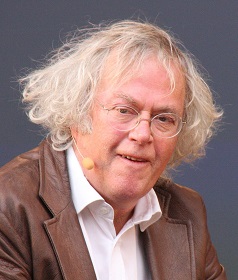
Dag Solstad (Sandefjord, 16 juli 1941)
De Franse dichter en schrijver van chansons Bernard Dimey werd geboren op 16 juli 1931 in Nogent-en-Bassigny (tegenwoordig Nogent). Zie ook alle tags voor Bernard Dimey op dit blog.
La crucifixion
I
Tu viens c’t’ après-midi à la crucifixion ?
T’as qu’à v’nir avec moi, ça t’chang’ra les idées !
Ta bergère est pas là, profit’de l’occasion
Moi j’ai prév’nu Lévy que j ’prenais ma journée
J’y ai dit « j’veux voir ça, et pis j’ai mes raisons ! »
Il a pas pu r’fuser vu qu’il y va, cézigue !
Ça va ram ’ner du monde et marquer la saison
C’ t’affair’là, tu vas voir, mais le truc qui m’intrigue
C’est qu’sur les trois clients qu’ils vont foutre au séchoir
Y en a deux, paraît-il, qu’on a dû bien connaître
Ils nous ont fait marron sur un coup d’marché noir
On ira les r’garder, ça les amus’ra p’t’être
Quand on avait l’tuyau pour les surplus romains
J’avais tout préparé, tout mâché la besogne,
On était cinq su’l’coup, vraiment du cousu-main !
Quand ils nous ont doublé, on a passé la pogne
Mais j’dois dire qu’aujourd’hui, je vais bien rigoler
Comm’quoî, mon vieux cochon, y a tout d’même un’justice
Comm’disait mon vieux père : « Faut pas tuer ni voler à moins
D’être certain que le coup réussisse ! »
Le troisième, il paraît qu’il marche à la gamberge
Il jacte à droite à gauche, on l’a vu v’nir de loin
Il est pas vieux du tout, il n’a pas trente-cinq berges
On n’sait pas bien qui c’est, c’est pas un gars du coin
C’est un genr’de r’bouteux, il guérit les malades
Ça fait trois ans, guèr’plus, qu’il est sur le trimard
N’empêch’que le Pilate et ses p’tits camarades
L’ont prié d’obéir et d’arrêter son char
Comm’disait mon vieux père : « La poisse, elle vient tout’seule
Mais plus tu veux jacter, plus qu’ell’vient rapid’ment
C’est un’bell’qualité d’savoir fermer sa gueule »
Mon père, pour un ivrogne, il n’manquait pas d’jug’ment !
D’ailleurs, en fait d’jug’ment, c’est par là qu’ça commence
Si tu veux v’nir, tu viens… Moi j’veux pas m foutr’en r’tard
Tu viens pas… Moi j’m’en vais… J’te dirai c’que j’en pense !
J’pass’rai pour l’apéro, à sept heures, au plus tard.
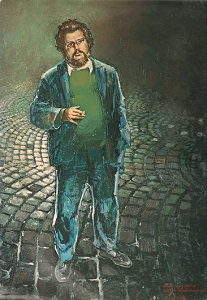
Bernard Dimey (16 juli 1931 – 1 juli 1981)
De Oostenrijkse schrijfster en politica Andrea Wolfmayr werd geboren op 16 juli 1953 in Gleisdorf. Zie ook alle tags voor Andrea Wolfmayr op dit blog.
Uit: Wenn du weggehst von zuhause
„Demut vor der Arbeit von vielen war für mich ein Ergebnis, und der wachsende Wunsch, noch besser zusammenzuarbeiten, um mehr zu erreichen.
Kurz gefasst: Für die Gleisdorferin in Wien war es ein Jahr voll Staunen, interessierter Teilnahme, Aufmerksamkeit, Wachsamkeit. Dauerndes Lernen, jeden Tag neue Erfahrungen, das Kennenlernen unsäglich vieler Menschen, verschiedenste und kontroversiellste Sicht von aktuellen Problemen. Spannend und begeisternd – manchmal auch erschöpfend und anstrengend.
Was bleibt und wohl immer bleiben wird: die Verbundenheit mit Gleisdorf. Denn eines Tages möchte ich zurückkehren in unsere Stadt mit ihren überschaubaren Strukturen und ihrer lebens- und liebenswerten Umgebung. Hier bin ich zuhause, von hier stamme ich, hierher fühle ich mich zugehörig. Und wenn ich auch dabei bin, mir weitere “Heimaten” zu erwerben, Graz, das schon lang eine zweite Heimat ist, Wien, und vielleicht als nächstes noch weitere europäische oder osteuropäische Städte – Gleisdorf wird immer Heimat bleiben, Vaterstadt, Mutterstadt. Mein Hirn ist zwar zur Zeit in Wien, mein Körper dauernd unterwegs. Aber hier, in Gleisdorf, ist mein Herz.”
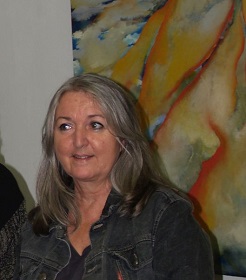
Andrea Wolfmayr (Gleisdorf, 16 juli 1953)
De Franse dichter en schrijver Pierre Benoit werd geboren op 16 juli 1886 in Albi. Zie ook alle tags voor Pierre Benoit op dit blog.
Uit: L’Atlantide
« Voilà cinq mois que j’en faisais fonction, et, ma foi, je supportais bien cette responsabilité et goûtais fort cette indépendance. Je puis même affirmer, sans me flatter, que, sous ma direction, le service avait marché autrement que sous celle du capitaine Dieulivol, le prédécesseur de Saint-Avit. Brave homme, ce capitaine Dieulivol, colonial de la vieille école, sous-officier des Dodds et des Duchesne, mais affecté d’une effroyable propension aux liqueurs fortes, et trop enclin, quand il avait bu, à confondre tous les dialectes et à faire subir à un Haoussa un interrogatoire en sakalave. Personne ne fut jamais plus parcimonieux des ressources en eau du poste. Un matin qu’il préparait son absinthe, en compagnie du maréchal des logis chef, Châtelain, les yeux fixés sur le verre du capitaine, vit avec étonnement la liqueur verte blanchir sous une dose d’eau plus forte qu’à l’ordinaire. Il releva la tête, sentant que quelque chose d’anormal venait de se produire. Raidi, la carafe inclinée à la main, le capitaine Dieulivol fixait l’eau qui dégouttait sur le sucre. Il était mort.
Cinq mois durant, après la disparition de ce sympathique ivrogne, on avait semblé se désintéresser en haut lieu de son remplacement. J’avais même espéré un moment qu’une décision serait prise, m’investissant en droit des fonctions que j’exerçais en fait… Et aujourd’hui, cette soudaine nomination…
Le capitaine de Saint-Avit… À Saint-Cyr, il était de mes recrues. Je l’avais perdu de vue. Puis mon attention avait été rappelée sur lui par son avancement rapide, sa décoration, récompense méritée de trois voyages d’exploration particulièrement audacieux, au Tibesti et dans l’Aïr ; et soudain, le drame mystérieux de son quatrième voyage, cette fameuse mission entreprise avec le capitaine Morhange, et d’où un seul des explorateurs était revenu. Tout s’oublie vite, en France. Il y avait bien six ans de cela. Je n’avais plus entendu parler de Saint-Avit. Je croyais même qu’il avait quitté l’armée. Et maintenant, voici que je me trouvais l’avoir pour chef.”
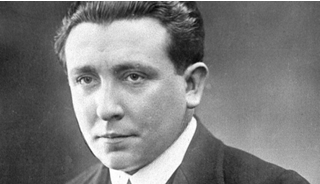
Pierre Benoit (16 juli 1886 – 3 maart 1962)
De Oostenrijkse schrijver Franz Nabl werd geboren op 16 juli 1883 in Lautschin.Zie ook alle tags voor Franz Nabl op dit blog.
Uit: The Long Arm (Vertaald door Roy Temple House)
« The longer we talked the more intimate, the more in the nature of a mutual confession, our conversation became. I admitted to Banaotovich that the hifalutin fashion in which I had left the town to win fame and fortune years before, had been asinine in the extreme, and that it
served me just right to have to sneak back unknown and penniless.
Banaotovich rejoined that for all his pride in his school marks he had remained a person of no importance, and that the pot had not the slightest intention of making itself ridiculous by calling the kettle black. He seemed almost painfully inclined to run himself down. I could feel in his manner a sort of pathetic reaching out for sympathy and consideration. And it began to seem as if he were about to tell me something or ask me for something. But whatever he had to tell seemed hard to say, and it was slow in coming over his lips.
Banaotovich ordered two bottles of the heavy native wine. I drank sparingly of it, because it goes to my head. But Banaotovich swallowed two or three glassfuls in hasty succession, and his cheeks grew flushed.
There was a pause. Suddenly he leaned across the table toward me and spoke in a hoarse, excited whisper.
“Modersohn,” he said anxiously, “I want to make a confession to you – a terrible confession. It may turn you against me completely. Maybe you don’t want to hear it. If you don’t, say so, and I’ll go home. But it seems as if I’ve got to tell somebody about it. It seems as if I’ve got to find somebody who understands me and can excuse me, or it will kill me. Shall I tell you? Shall I?”
I was startled. I was reasonably sure that Banaotovich was no criminal, since he had lived half a century in his native city, undisturbed and from all he had told me solvent and respected. I had always known that he was a queer fish, a brooding, solitary sort of person, and I settled
myself to listen to some harmless bit of psychopathy which meant nothing except to the unfortunate subject.”
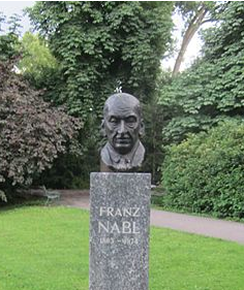
Franz Nabl (16 juli 1883 – 19 januari 1974)
Borstbeeld in Graz
